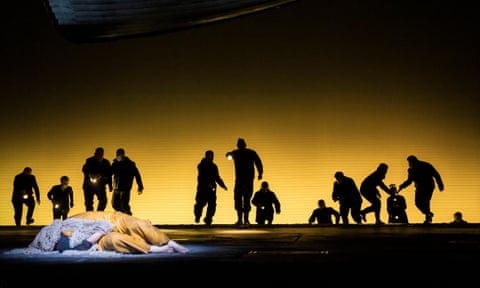The Royal Opera House’s new production of Peter Grimes opens tonight with Allan Clayton in the title role. Benjamin Britten’s opera premiered at Sadler’s Wells theatre in 1945. “Here at last was a real English opera … nothing like this had ever happened before in English music,” said composer and conductor Imogen Holst after its premiere. “Masterly writing … genius … a most thrilling work,” declared William Glock, reviewing for the Observer.
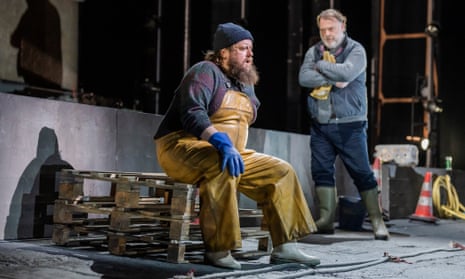
A lonely fisherman, a lost soul
Allan Clayton and Bryn Terfel photographed from the wings during rehearsals
Britten’s opera is based on a chapter from George Crabbe’s 1810 verse narrative The Borough. It tells of a lonely fisherman in an isolated and claustrophobic coastal village who causes the death of his young apprentices and loses his mind out of guilt and fear. “Britten’s version differs very much from Crabbe’s original poem,” says Allan Clayton, who sings the title role. “In the former he’s a really nasty piece of work and gets his comeuppance, but in Britten’s treatment it’s grey, not black and white.”
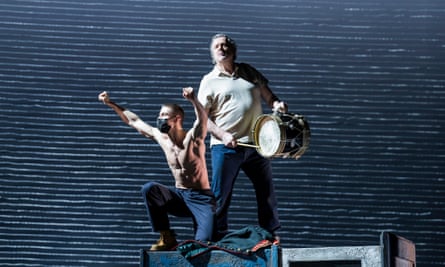
Sam Morris and Stephen Richardson in rehearsal, rousing the lynch mob that marches to Grimes’ cliff-top hut
“A central feeling for us,” wrote Britten of his opera, “was that of the individual against the crowd, with ironic overtones for our own situation.” Conscientious objectors, Britten and his partner Peter Pears had left Europe for the US during the war. As gay men at a time when homosexuality was illegal the two were doubly outsiders.
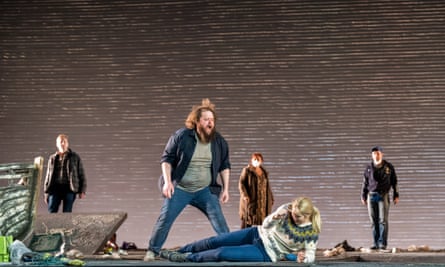
Britten’s Grimes is more sinned against than sinner. “There is nothing in the music or the words to indicate that he is a dramatisation of what Crabbe wrote about originally,” says conductor Mark Elder. “Crabbe wrote about a murderer. Britten’s Grimes is not even an abuser. He’s a bully, he’s short-tempered and unpredictable but he doesn’t lay hands on the boy. This Grimes is a lost soul, who doesn’t know how to live in a community, [but he is also] a poet and a visionary. ”
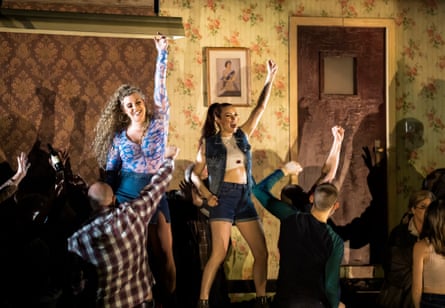
Alexandra Lowe and Jennifer France as landlady Auntie’s ‘nieces’ in The Boar, the Borough’s pub

‘I started with the “mad” scene’
Clayton as Peter Grimes
“For me, it all began at the end,” says Clayton, who made his role debut as Grimes when Deborah Warner’s production premiered in Madrid in April 2021. “I started with this so-called mad scene – I wanted to know what that was in reality. It’s very clearly a complete psychotic break. I read academic papers and tried to understand it, it was important that that was nailed on and then I could work back to the events leading up to that. If you think of the traumatic events he goes through over the course of the opera – the last two months of his life, say, it really does help shape things. He’s not blameless in what happens, but his sin is more one of negligence.”
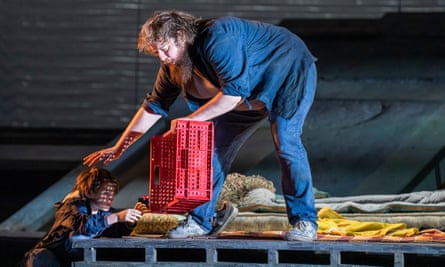
Clayton with Cruz Fitz (John, the apprentice) on stage during a break in rehearsals
Warner’s production is set in today’s world. “We were keen to bring this story alive in a contemporary frame and not get caught in dangerous sentimentalisation of the poverty of the past, where the true pains and grudges birthed by deprivation can get lost. The poor and depressed nature of the community is central to the piece … Peter Grimes is rejected by a savage and stressed community, and that had to feel immediate,” she says.
“The difficulty with this piece for a modern day audience is that you’re talking about an apprentice in a way that made sense in early 19th-century England but how do you make sense of that in a modern society?” adds Clayton. “The great Philip Langridge – who did this role many times – said were he stage a production, every man on stage would have an apprentice because that’s how normal it was.”
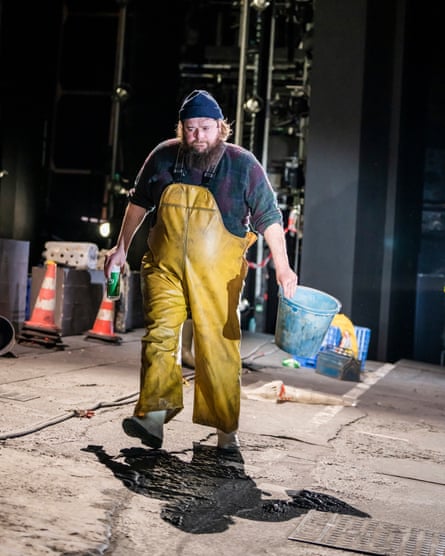

“I would argue that this is the national opera of Britain,” says Clayton “and to do it here in this House, with this company, and this conductor, is particularly special. Literally outside my dressing room there’s a picture of Peter Pears as Peter Grimes – for whom the role was written, that I walk past every time I go on stage.”
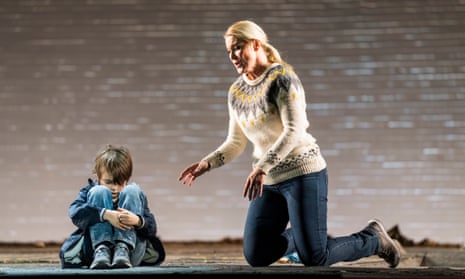
‘Ellen defends the weak’
Cruz Fitz (the apprentice) and Maria Bengtsson
The role of Ellen – the only unambiguously good character on stage, can be difficult to breathe life into. “I had my problems with her before I got to know Deborah” agrees Swedish soprano Maria Bengtsson. But in Warner’s production the two have created “a strong real and courageous modern woman”. Ellen, like Grimes, she points out, is an outsider in the community, lonely and seeking love. “Ellen sees that she can maybe help Peter by listening to him without judging him like the others do. She defends the weak in society – she also tries to help the boy. In her very first aria in the first act she says: ‘Let her among you without fault/ Cast the first stone.’ ie none of you are saints. So let me try to help Peter rather than condemn him.”
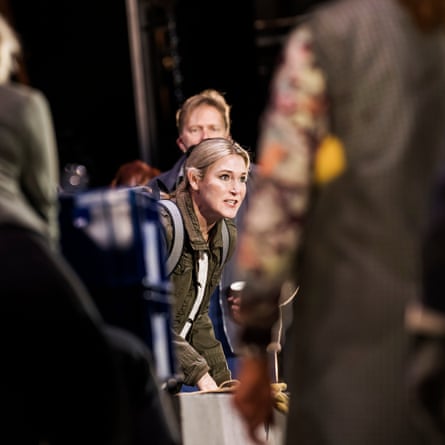
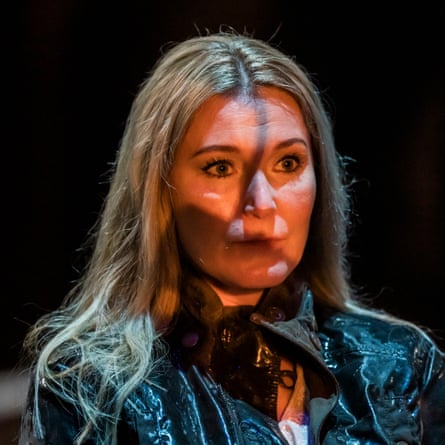
Maria Bengtsson photographed in the wings
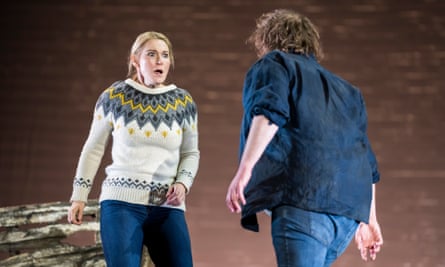
Maria Bengtsson and Allan Clayton
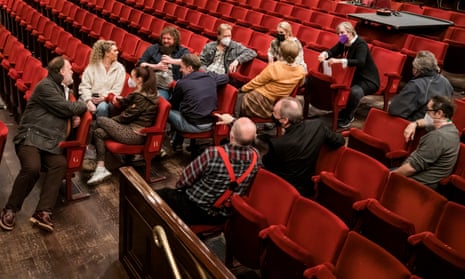
‘The Borough has no appetite for difference’
Deborah Warner, seated far right, talks to the principal singers in the Peter Grimes cast before rehearsal at the Royal Opera House
Bryn Terfel plays Captain Balstrode, the closest thing Grimes has to a friend in the Borough. He first sung the role 24 years ago also in Covent Garden, in Elijah Moshinsky’s production. “The opera is as relevant and powerful today as it was when it was first written. “In the end everybody has the sense of having blood on their hands. Sometimes I walk away with tears in my eyes,” he says.
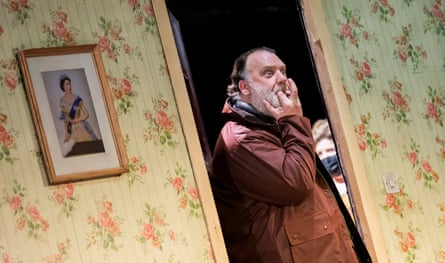
Bryn Terfel in rehearsal
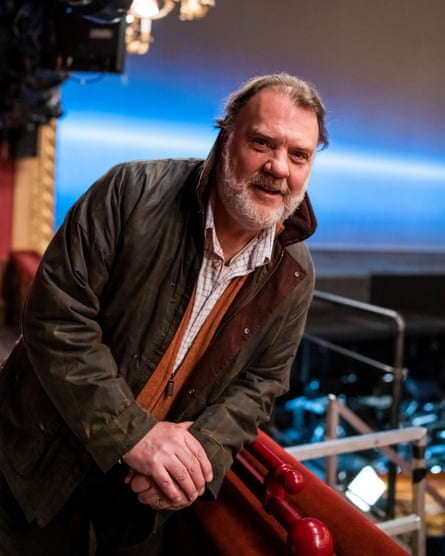

Bryn Terfel and Jacques Imbrailo
Jacques Imbrailo plays Ned Keene. “In this production Ned is a bit of a wide-boy, a wheeler dealer who gets stuff off the back of lorries. My costume is all bling and bumbag. I get the community what they need. Whether laudanum for Mrs Sedley, or even a boy apprentice for Peter.” Imbrailo grew up in South Africa and first encountered Britten as a student at London’s Royal College of Music. “His music is just remarkable. Ravishing. Heartbreaking. It’s always satisfying to sing partly as it’s so beautifully written but also the characters he creates are so rich”
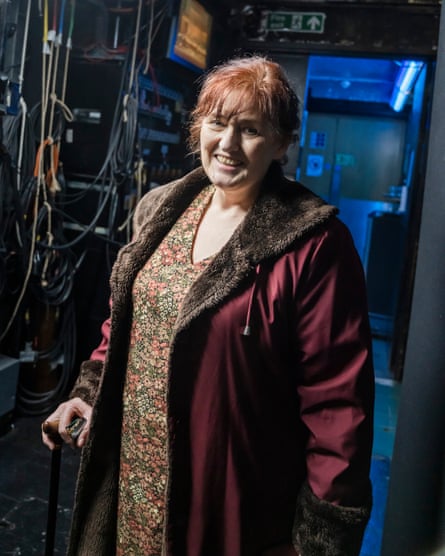

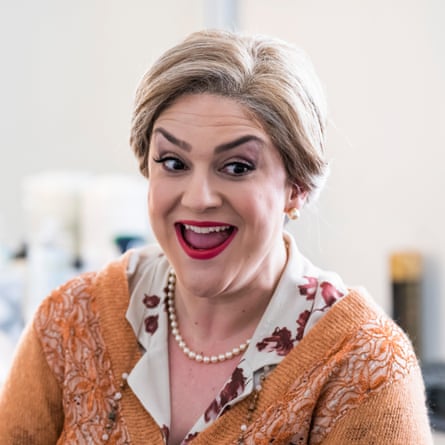
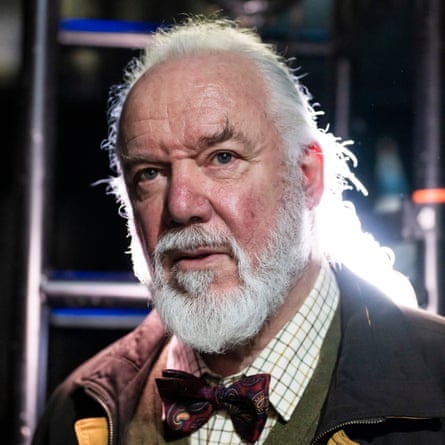
Clockwise from top left: Catherine Wyn-Rogers, John Graham-Hall, John Tomlinson and Rosie Aldridge
Catherine Wyn-Rogers is Auntie: “She runs the local pub, she’s a business woman and keeps on the right side of everybody. She’s been there, seen that, done it all, so she has a great understanding and experience of human nature.” John Graham-Hall is Bob Boles, a fisherman and Methodist. “He hates Grimes,” says Graham-Hall. “Although he probably hates himself as well. He spends the whole of the first act trying – and failing – to get everybody in the village going; by act two he has convinced people that the death of the first apprentice was entirely Peter’s fault, and there’s a witch hunt to go and lynch him.”
Rosie Aldridge is Mrs Sedley. “Much of the comedy in the opera comes from her but there’s nothing funny about Mrs Sedley – she’s toxic and dangerous and a bigot. She’s addicted to pain killers and is obviously a very deeply unhappy person. She scuttles about like a mad woman and she can’t keep still – she’s always fidgeting. I quite often have anxiety after I’ve come off stage at the end of the evening because she has such high energy. I have to take deep breaths and make a conscious effort sometimes to let her go!” Swallow, the magistrate and coroner is sung by bass John Tomlinson.
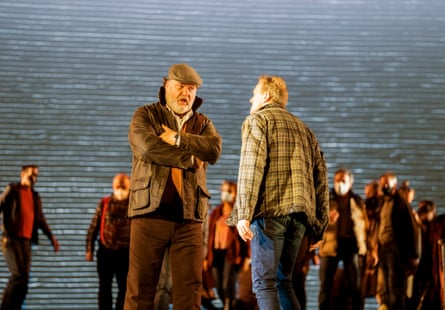
Terfel with Graham-Hall
Bob Boles is an unlikable character, but, as Graham-Hall points out: “He spends an awful lot of time saying what might be regarded as common sense, at least today – for example, this apprentice system is uncivilised and unchristian.”
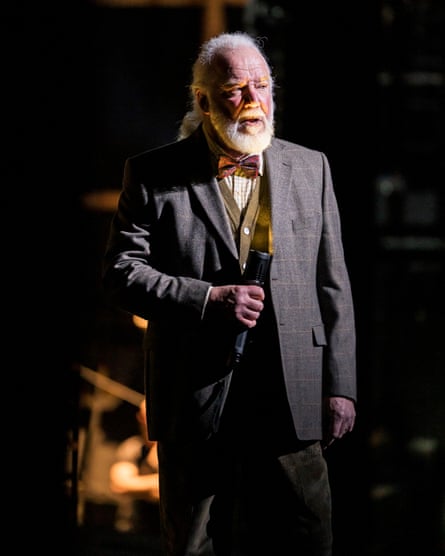

John Tomlinson, Jennifer France and Alexandra Lowe photographed from the wings during rehearsals
“Britten’s Grimes is haunted by the horror of a recent accident, horrified by rumour’s tongue, and someone who – perhaps – always did things differently to those around him. The Borough has no appetite for difference. It is not only poor and narrow, but very solid … a sort of moral brick wall, cut off and blinkered,” says Warner.
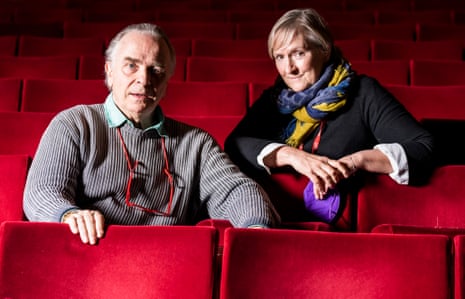
‘The edges must be sharp’
Conductor Mark Elder and director Deborah Warner
“We had our first two orchestral rehearsals last week and literally four of those six hours I was covered in goosebumps. The music is just extraordinary, and especially with this orchestra under Mark Elder it’s the best of the best,” says Clayton.
“This music doesn’t work unless the edges are sharp,” says Elder. “There can be no fat sounds, like in so much of Britten, and that means that everybody has to have an incredible awareness and commitment to the control of the pulse of the music. The colours of the story are mirrored in the colours of the orchestra. It’s not a wash of colour – like, say, Debussy; those Aldeburgh beaches are pebbly, and the skies are grey. It’s not acres of gorgeous sand.”
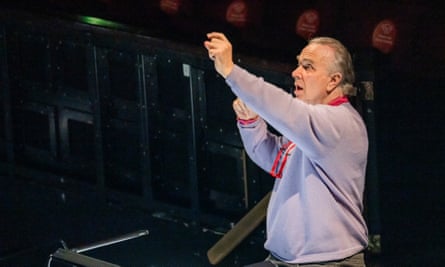
Conductor Mark Elder in the pit during rehearsals
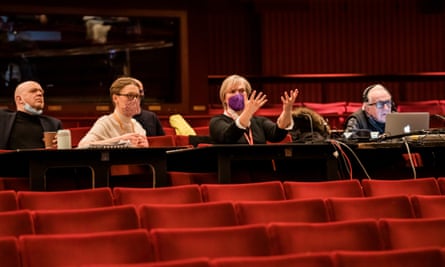
Movement director Kim Brandstrup, assistant director Isabelle Kettle, director Deborah Warner and lighting designer Peter Mumford working in the ROH stalls
“Britten managed to find sounds from the orchestra that capture something that he knew … there is an ability to rouse passion but his music is very clever. He was a master of knowing how to dish up his ingredients, better probably than any other 20th-century composer. He set words so beautifully. Most of it is so cleverly written that if it is cast right, it works,” continues Elder.
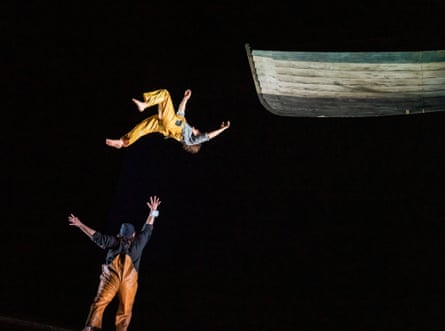
Clayton and aerialist Jamie Higgins in rehearsal
“Creating a new Peter Grimes is like directing Hamlet: you do it when, and if, you find the right performer for the part,” says Warner. “Grimes is a very complicated character. I’ve always struggled with feeling very sorry for him but also it’s hard not to see him as a predator, adds Aldridge. “I think audiences will come away from this production feeling absolutely desperate for him. It is heartbreaking. Allan has made him so human and you just want to make it better for him.”
Deborah Warner’s staging of Peter Grimes is at the Royal Opera House, London, until 31 March, and at Opéra National de Paris in January 2023. It will be filmed and available to watch on demand at a future date, check stream.roh.org.uk for details.
